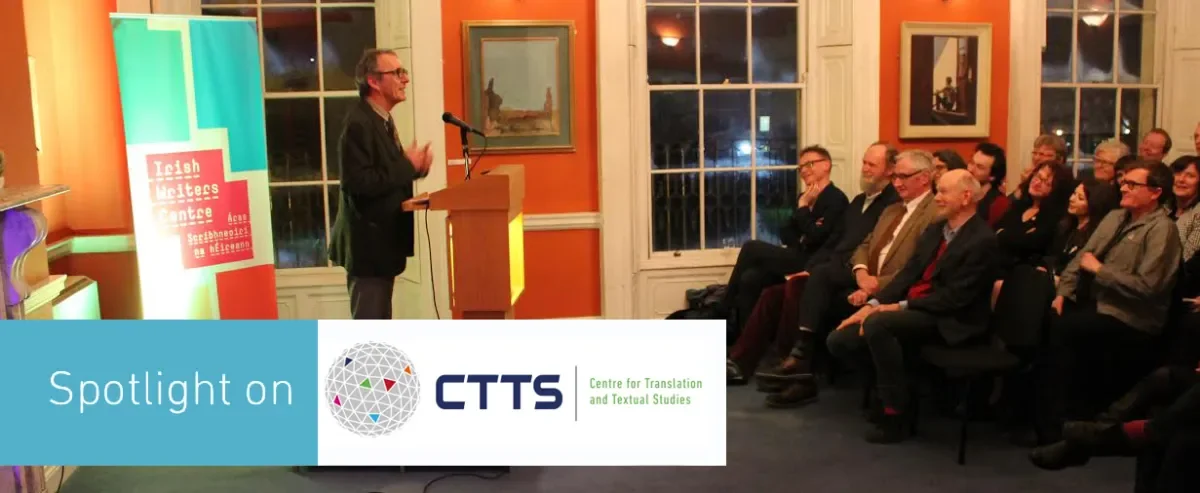

Center Spotlight Series Archive CTTS
You can find the archive of the featured research centres here.
Centre for Translation and Textual Studies
Despite massive strides in recent years in science and technology, language and communication remains a fundamental challenge for global business and society today. The team in the Centre for Translation and Textual studies, established in 2000, is engaged in high quality, innovative and interdisciplinary research on any matter related to multimodal, multilingual and translingual communicative practices.
The CTTS vision is to be internationally and nationally recognised as a leading research institute in applied language research with a distinguished reputation specifically in the research areas of translation, interpreting, language technology, computer-aided language learning, language policy and language planning.
CTTS has a proven record in:
• Using innovative methods, such as eye tracking
• Crossing disciplines to gain much broader understandings of challenges
• Conducting applied research relevant to today’s society
• Collaborating with multinational and national enterprises
• Collaborating with governmental and non-governmental organisations
The CTTS Mission is to contribute to democratic and secure societies by:
• Conducting world class research on multimodal, multilingual and translingual communicative practices
• Advocating, through our research, for the pivotal role of language in underpinning international social and cohesive structures
• Enabling new scholars to engage with, and contribute to, society and social and commercial enterprise
CTTS engages with a variety of commercial and social enterprises in areas such as Media & Games,Translation & Localisation, Governmental language policy and planning and Non-governmental humanitarian organisations.
Research areas include:
• Digital literacies and computer-aided language learning
• Crowdsourcing for translation and localisation; Fansubbing
• Cognitive ergonomic impacts of technologies on professional and volunteer translators
• Ecocriticism and children’s literature
• Audiovisual translation and minority languages
• Community interpreting
• Ethics and translation technology
• Reception of multimodal media practices
• Human-computer interaction
Commencing in April 2017, the CTTS, with Dr Sharon O'Brien as PI, will coordinate an EU-Funded project called “INTERACT”. INTERACT stands for the “International Network in Crisis Translation” and is an H2020 Marie Sklodowska-Curie Research and Innovation Staff Exchange Network aimed at researching the role of translation in crisis scenarios, with a particular focus on health-related crises. It brings together a unique combination of actors from social science, humanities, technology developers and humanitarian responders. The partners include Dublin City University, University College London, University of Auckland, Arizona State University, as well as Translators without Borders, Cochrane, Unbabel and Microsoft. The research will revolve around themes such as crisis communication policies, simplification of health content, machine translation, training citizen translators and ethics.
We apply our research to real-world problems using cutting edge technologies such as eye tracking. We do interdisciplinary research, drawing on domains such as computer science, psychology, cognitive science, literature, immigrant and media studies.
Our recent publications include:
Forthcoming:
Lucía Pintado Gutiérrez and Alicia Castillo Villanueva (Eds), Translation, Conflict and Memory: Narratives of the Spanish Civil War and the Dictatorship (2018)
2017:
Michael Cronin, Eco-Translation: Translation and Ecology in the Age of the Anthropocene (Routledge)
Alicia Castillo-Villanueva, "The recession in contemporary Spanish cinema: Masculinity in transition", in L. Ryan and A. Corbalán (eds.) The Dynamics of Masculinity in Contemporary Spanish Culture (Routledge)
Mary Phelan 'Analytical assessment of legal translation: a case study using the American Translators Association framework'. JOURNAL OF SPECIALISED TRANSLATION, (27):189-210
Joss Moorkens, 'Under pressure: translation in times of austerity'. Perspectives: Studies in Translatology, 25 (3):1-14
Dorothy Kenny (ed.) Human Issues in Translation Technology (Routledge), featuring contributions by CTTS members and adjunct members Dr Sharon O’Brien, Dr Joss Moorkens, Prof Minako O’Hagan, Dr Stephen Doherty and Prof Jenny Williams, among others.
2016:
Áine McGillicuddy, adjunct member Dr Eithne O’Connell and CTTS graduate member Dr Dana Cocargeanu, ‘Beatrix Potter: A Hundred Years in Translation’ in Children’s Literature in Education, 47, 4 December 2016.
Ryoko Sasamoto, adjunct member Prof Minako O’Hagan and Dr Stephen Doherty, ‘Telop, Affect, and Media Design: A Multimodal Analysis of a Japanese TV Program’ in Television and New Media, 17 November 2016.
Patrick Cadwell, Sheila Castilho, Sharon O’Brien, and Linda Mitchell. 'Human factors in machine translation and post-editing among institutional translators' Translation Spaces 5 (2): 222–243.
Francoise Blin, 'The theory of affordances' In: Learner Computer Interactions: New insights on CALL theories and applications. (John Benjamins Publishing)
CTTS Members are:
Dr Áine McGillicuddy (Director)
Prof Michael Cronin
Prof Dorothy Kenny
Prof Françoise Blin
Dr Sharon O’Brien
Dr Joss Moorkens
Dr Patrick Cadwell
Dr Ryoko Sasmoto
Dr Mary Phelan
Dr Lucia Pintado-Gutiérrez
Dr Alicia Castillo-Villanueva
Dr Qi Zhang
Dr Angela Leahy
